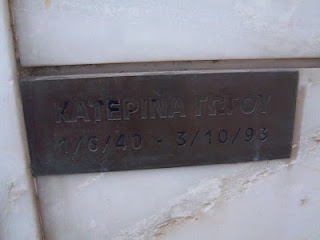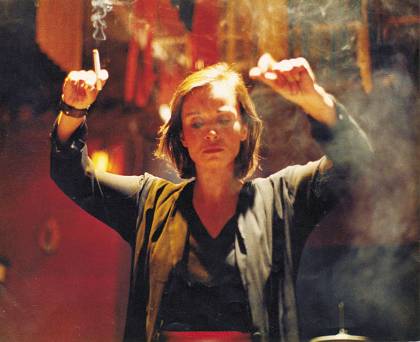Katerina Gogou (Κατερίνα Γώγου)
The Loneliness (Η μοναξιά, 1981)
Loneliness...
Does not have the dismal color in her eyes
of the girlfriend floated in the sky.
She will not ramble, aimless, lazy
shaking her gambs at concert halls
and inside the freezing museums.
She is not your yellow pictures of “good” old times,
or the mothballs in grandmama’s chests,
purple ribbons and straw brim hats.
She does not spread her legs and give strangled squeals,
gazing like a cow, with sharp, rapid sighs
and matching lingerie.
The Loneliness.
She has the color of the Pakistanis, this loneliness.
And shall be accounted, dish by dish,
along with every broken fragment
at the bottom of the stairwell.
She stands upright, patiently, in line:
Pittsburgh – Santa Barbara – Red Hill
Toombah – Crossroads – Calamary Point
Below any color of sky
Her head sweats.
Ejaculates screaming breaking windows with chains,
Occupies the Means of Production,
Puts the Torch to Private Property.
She is the Visitors’ Hall on Sundays, at the prisons,
the same shuffle-in-the-yard, the convicts and revolutionaries.
She is sold and bought, minute by minute, breath by breath
at the slavemarkets of Earth – here, nearby,
is the square where they are traded.
Arise in the morning.
Awaken to see her.
She is a poutana in the ruined houses
a nightwatch for the soldiers
and the final, final, final
endless kilometres of the NATIONAL ROAD – CENTER CITY
lined with the trapped flesh from Bulgaria.
And when her blood congeals and she can bear no more
of her kind being sold out
she dances the Zem-be-ki-ko barefoot on the tables
holding in her stiff-blue hands
a well-sharpened hatchet
loneliness
The Loneliness, I say to us. Of ours, I tell.
It is a hatchet in our hands
Above your heads: watch it turn, watch it turn
Freely adaπted from the Greek by Nikos.Evangelos, 2013.
Astoria - Melbourne - Toronto - Chicago - Cape Town - Beirut
Bournazi - Ayia Varvara - Kokkinia - Touba - Stavroupoli - Kalamaria
Katerina Gogou, 1940-1993, was the anarchist poet of Exarchia and a bonafide Greek movie idol. Somehow I never heard of her until a couple of weeks ago, when I ran into, and was stung by, her poem “I Monaksia” (“The Loneliness”). As real Greek culture goes, I am but a bumptious American. I may love Bithikotsis but I couldn't tell Cavafy from Gaddafi, and more than once I almost forgot that Zorba is not originally a movie with Anthony Quinn.
Katerina. Now I feel as though I know her. She was a permanent revolutionary, always a proclaimed anarchist. Trained as an actor from childhood, she became a leading lady and later gave up on it to set her poems to eighties techno. Must we all make sensible decisions? She’s been described as a wild animal. By all accounts she grew apart from the domesticated animals and finally killed herself, age 52. Now you can see her perform on Youtube. I've been captivated by various scenes from a movie called Η Παραγγελἰα (“the order,” as in for a delivery). I wish I could find the whole movie. It seems to convey an urban story through images set to her poems, but maybe there is also dialogue.
Here is her recitation of “The Loneliness” from the film.
http://www.youtube.com/watch?v=1TC06DzdDvo
I can see greatness, and watched this many times, but much was lost on me. (My Greek’s not good enough, but lately getting better.) Lack of understanding may have contributed to my obsession. There didn’t seem to be an English translation. Or secretly, I didn’t want to find one. In this one small thing, the first English rendering of her best-known words, she would be mine! I struggled – many hours, over days, to produce the above. I took liberties, to give it as I believe she meant it, to make it strike people over the head with intent to split, as it does in the Greek. One of her lines reads, literally:
at the slavemarkets of Earth – Kotzia is near here
Kotzia Square in Athens was, at the time of the poem, an outdoor market for day-laborers, where one would have seen the first small concentrations of Pakistanis in Greece. For clarity, I dropped the name and committed a heresy, adding a line:
at the slavemarkets of Earth – here, nearby,
is the square where they are traded.
And was it really too much of a stretch to turn Bournazi - former industrial zone, factories now refurbished into scene clubs, and most recently a site of depression like the rest of the country - into Pittsburgh?
Today, just as it was ready, while searching terms for a final check, I came across not one but two prior translations of “Loneliness” online. (Also, I discovered there is an out-of-print English volume of Katerina's poems, translated by Jack Hirchmann.)
You may compare the other two versions of “The Loneliness,” if you wish:
By Contrainfo http://en.contrainfo.espiv.net/2011/06/08/untitled/
By Taxikipali http://libcom.org/history/katerina-gogo ... -1940-1993
Modesty does not suit me. I worked hard for it and I think I win!

Also, I discovered her tomb in the Athens First Cemetary. Or rather, a picture of it online – behind that plaque, presumably, are her bones.

As this is the fate of almost all Greeks in Greece, even anarchists and unbelievers, I shall assume it; that her bones were dug up, seven to fifteen years after her death, dusted off, and put in a box, now behind that plaque.
Do not rest, Katerina - haunt them! Haunt the bastards! Chase this earth into another one!
Now here is the poem as Katerina wrote it:
Κατερίνα wrote:
Η μοναξιά
(Κατερίνα Γώγου)
Η μοναξιά…
δεν έχει το θλιμένο χρώμα στα μάτια
της συννεφένιας γκόμενας.
Δεν περιφέρεται νωχελικά κι αόριστα
κουνώντας τα γοφιά της στις αίθουσες συναυλιών
και στα παγωμένα μουσεία.
Δεν είναι κίτρινα κάδρα παλαιών «καλών» καιρών
και ναφθαλίνη στα μπαούλα της γιαγιάς
μενεξελιές κορδέλες και ψάθινα πλατύγυρα.
Δεν ανοίγει τα πόδια της με πνιχτά γελάκια
βοϊδίσο βλέμα κοφτούς αναστεναγμούς
κι ασορτί εσώρουχα.
Η μοναξιά.
Έχει το χρώμα των Πακιστανών η μοναξιά
και μετριέται πιάτο-πιάτο
μαζί με τα κομμάτια τους
στον πάτο του φωταγωγού.
Στέκεται υπομονετικά όρθια στην ουρά
Μπουρνάζι – Αγ. Βαρβάρα – Κοκκινιά
Τούμπα – Σταυρούπολη – Καλαμαριά
Κάτω από όλους τους καιρούς
με ιδρωμένο κεφάλι.
Εκσπερματώνει ουρλιάζοντας κατεβάζει μ’ αλυσίδες τα τζάμια
κάνει κατάληψη στα μέσα παραγωγής
βάζει μπουρλότο στην ιδιοχτησία
είναι επισκεπτήριο τις Κυριακές στις φυλακές
ίδιο βήμα στο προαύλιο ποινικοί κι επαναστάτες
πουλιέται κι αγοράζεται λεφτό λεφτό ανάσα ανάσα
στα σκλαβοπάζαρα της γης – εδώ κοντά είναι η Κοτζιά
ξυπνήστε πρωί.
Ξυπνήστε να τη δείτε.
Είναι πουτάνα στα παλιόσπιτα
το γερμανικό νούμερο στους φαντάρους
και τα τελευταία
ατελείωτα χιλιόμετρα ΕΘΝΙΚΗ ΟΔΟΣ-ΚΕΝΤΡΟΝ
στα γατζωμένα κρέατα από τη Βουλγαρία.
Κι όταν σφίγγει το αίμα της και δεν κρατάει άλλο
που ξεπουλάν τη φάρα της
χορεύει στα τραπέζια ξυπόλυτη ζεμπέκικο
κρατώντας στα μπλαβιασμένα χέρια της
ένα καλά ακονισμένο τσεκούρι.
Η μοναξιά
η μοναξιά μας λέω. Για τη δική μας λέω
είναι τσεκούρι στα χέρια μας
που πάνω από τα κεφάλια σας γυρίζει γυρίζει
And, finally, here is another poem, actually only a part of it, that Katerina's reminds me of:
Ginsberg wrote:
II
What sphinx of cement and aluminium bashed open their skulls and ate up their brains and imagination?
Moloch! Solitude! Filth! Ugliness! Ashcans and unobtainable dollars! Children screaming under the stairways! Boys sobbing in armies! Old men weeping in the parks!
Moloch! Moloch! Nightmare of Moloch! Moloch the loveless! Mental Moloch! Moloch the heavy judger of men!
Moloch the incomprehensible prison! Moloch the crossbone soulless jailhouse and Congress of sorrows! Moloch whose buildings are judgement! Moloch the vast stone of war! Moloch the stunned governments!
Moloch whose mind is pure machinery! Moloch whose blood is running money! Moloch whose fingers are ten armies! Moloch whose breast is a cannibal dynamo! Moloch whose ear is a smoking tomb!
Moloch whose eyes are a thousand blind windows! Moloch whose skyscrapers stand in the long streets like endless Jehovas! Moloch whose factories dream and choke in the fog! Moloch whose smokestacks and antennae crown the cities!
Moloch whose love is endless oil and stone! Moloch whose soul is electricity and banks! Moloch whose poverty is the specter of genius! Moloch whose fate is a cloud of sexless hydrogen! Moloch whose name is the Mind!
Moloch in whom I sit lonely! Moloch in whom I dream angels! Crazy in Moloch! Cocksucker in Moloch! Lacklove and manless in Moloch!
Moloch who entered my soul early! Moloch in whom I am a consciousness without a body! Moloch who frightened me out of my natural ecstasy! Moloch whom I abandon! Wake up in Moloch! Light streaming out of the sky!
Moloch! Moloch! Robot apartments! invisable suburbs! skeleton treasuries! blind capitals! demonic industries! spectral nations! invincible madhouses! granite cocks! monstrous bombs!
They broke their backs lifting Moloch to Heaven! Pavements, trees, radios, tons! lifting the city to Heaven which exists and is everywhere about us!
Visions! omens! hallucinations! miracles! ecstacies! gone down the American river!
Dreams! adorations! illuminations! religions! the whole boatload of sensitive bullshit!
Breakthroughs! over the river! flips and crucifixions! gone down the flood! Highs! Epiphanies! Despairs! Ten years' animal screams and suicides! Minds! New loves! Mad generation! down on the rocks of Time!
Real holy laughter in the river! They saw it all! the wild eyes! the holy yells! They bade farewell! They jumped off the roof! to solitude! waving! carrying flowers! Down to the river! into the street!
Two weeks for 300 words! A prayer can be shorter, and be recited for many years. I prefer this manner of invocation.





